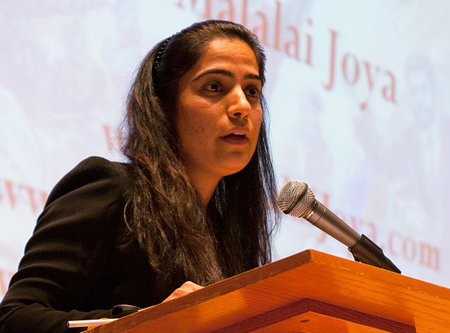
Malalai Joya
On October 7, the world will “celebrate” the tenth anniversary of the U.S. invasion of Afghanistan. Why did the United States send air and land troops into Afghanistan? To save the women … of course. How’s that working out?
Girls are going to school, and in big numbers. As many as 2.4 million girls have entered primary school. Few have finished, very few have gone on to secondary school. Girls’ schools are under attack. Women teachers are as well. The assaults can be physical and deadly, or verbal and “cultural” … and as deadly.
Recently, the Afghan government announced it would take over shelters for battered and abused women. The shelters had been accused of serving as a front for the sex work industry. If the government had taken over the shelters, women would have needed government approval and a virginity test before entering the shelter. Afghan women’s groups and feminists leapt into action and defeated much of the proposal. It was “a rare victory.” Even now, the remaining regulation states that a woman can only leave the shelter if she is moving to the residence of a male relative. The laws governing women’s movement may have changed, but women report that walking in the streets without male escort invites physical harm.
Some swell victory.
Meanwhile, in Kabul, the sex workers, part of a thriving sector, come and go, speaking of Michelangelo.
When it comes to “saving Afghan women”, there is only blur. The government shades into the Taliban. The aid agencies nestle in the embrace of the military until they are one and the same. All in the name of the liberation of Afghan women.
Afghan feminist Leeda Mehran recently described the “joke” of the current state of Afghan women’s liberation: “A man was at the beach when he heard a drowning person cry for help. He jumped into the water and saved him. He had just reached the shore when he heard another cry for help. He saved this one, too. This happened several times and he was saving one after another. What’s the joke? The man never realized that there was someone on a cliff near by pushing people into the sea…. There are people on the cliffs pushing women into the sea. We should not forget them.”
“Inconvenient” Afghan feminists have not forgotten and have never stopped organizing. As a member of the Loya Jirga, the Afghan Parliament, Malalai Joya argued against the power of the warlords. As a member of the world, Joya has protested the so-called world powers’ continued support of warlords, who claim to be against the Taliban. For Joya, those who leave warlords in power become warlords themselves. The Afghan blur has become the global blur.
Farzana Wahidy’s photographs focus attention on the complexities of Afghan women’s lives. Wahidy has photographed the dire – attempted suicide by self immolation; the everyday – women shopping, relaxing, doing what women do; the iconic – burqas; the joyful – weddings. She attempts to make the complex networks of context visual. Wahidy tries to show the common moments as she teaches the world how to see, how to look at, how to envision Afghan women.
Three years ago, the “charismatic” Sima Goryani founded the Ghoryan Women’s Saffron Association, an all-female co-op near Heart, with the slogan, “Why poppies, let us plant saffron!” At its inception, the cooperative had 72 members. Now they are close to 500. Five hundred women growers who are now taking on the misogyny of the marketplace, including that of international so-called saviors of whatever stripe, military or assistance.
One version of the Afghan women’s liberation story has been that Afghanistan is a great battle in which the lines are clear. On one side stand freedom, democracy and women’s rights. On the other the forces of evil line up under the banner of the Taliban. The real struggle is between progressive Afghan women and men, on one side, and a vast array of regressive forces, on the other. Which side are you on? Which side is your government, or your non-governmental organization, on? Afghan feminists want to know. No joke.
(Photo Credit: Revolutionary Association of Women of Afghanistan)